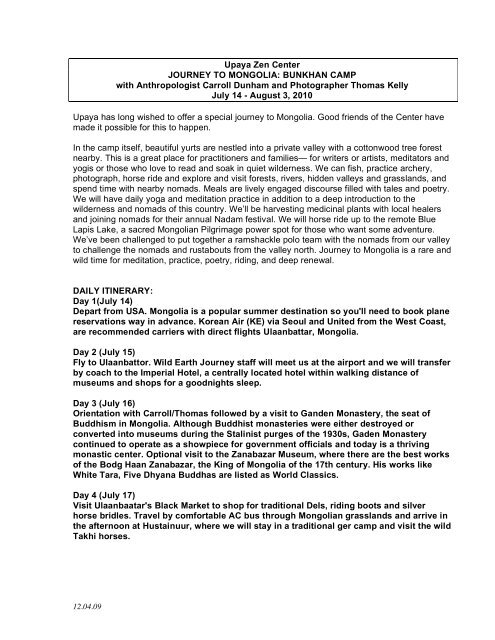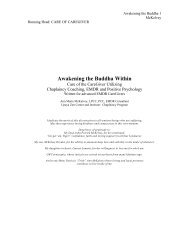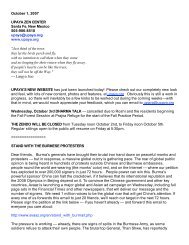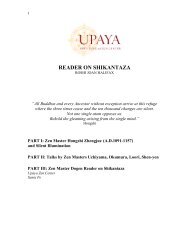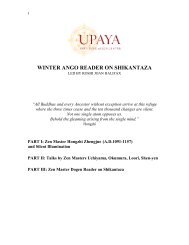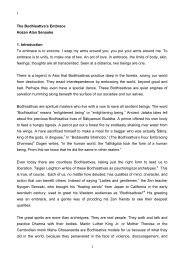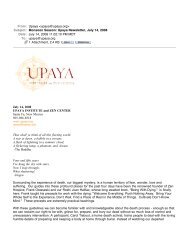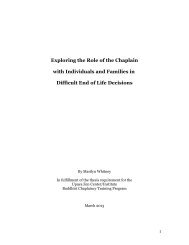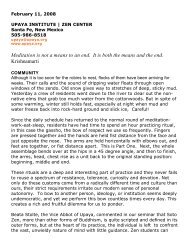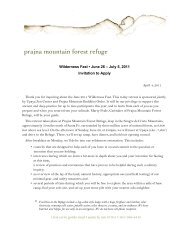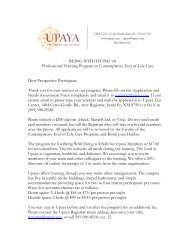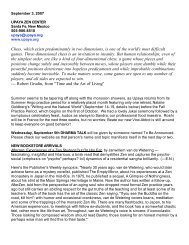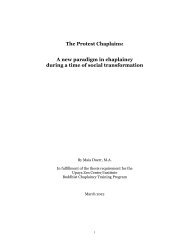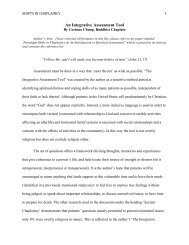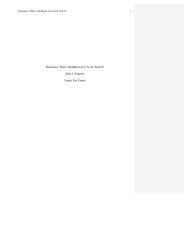Upaya Zen Center JOURNEY TO MONGOLIA: BUNKHAN CAMP ...
Upaya Zen Center JOURNEY TO MONGOLIA: BUNKHAN CAMP ...
Upaya Zen Center JOURNEY TO MONGOLIA: BUNKHAN CAMP ...
Create successful ePaper yourself
Turn your PDF publications into a flip-book with our unique Google optimized e-Paper software.
<strong>Upaya</strong> <strong>Zen</strong> <strong>Center</strong><br />
<strong>JOURNEY</strong> <strong>TO</strong> <strong>MONGOLIA</strong>: <strong>BUNKHAN</strong> <strong>CAMP</strong><br />
with Anthropologist Carroll Dunham and Photographer Thomas Kelly<br />
July 14 - August 3, 2010<br />
<strong>Upaya</strong> has long wished to offer a special journey to Mongolia. Good friends of the <strong>Center</strong> have<br />
made it possible for this to happen.<br />
In the camp itself, beautiful yurts are nestled into a private valley with a cottonwood tree forest<br />
nearby. This is a great place for practitioners and families— for writers or artists, meditators and<br />
yogis or those who love to read and soak in quiet wilderness. We can fish, practice archery,<br />
photograph, horse ride and explore and visit forests, rivers, hidden valleys and grasslands, and<br />
spend time with nearby nomads. Meals are lively engaged discourse filled with tales and poetry.<br />
We will have daily yoga and meditation practice in addition to a deep introduction to the<br />
wilderness and nomads of this country. We’ll be harvesting medicinal plants with local healers<br />
and joining nomads for their annual Nadam festival. We will horse ride up to the remote Blue<br />
Lapis Lake, a sacred Mongolian Pilgrimage power spot for those who want some adventure.<br />
We’ve been challenged to put together a ramshackle polo team with the nomads from our valley<br />
to challenge the nomads and rustabouts from the valley north. Journey to Mongolia is a rare and<br />
wild time for meditation, practice, poetry, riding, and deep renewal.<br />
DAILY ITINERARY:<br />
Day 1(July 14)<br />
Depart from USA. Mongolia is a popular summer destination so you'll need to book plane<br />
reservations way in advance. Korean Air (KE) via Seoul and United from the West Coast,<br />
are recommended carriers with direct flights Ulaanbattar, Mongolia.<br />
Day 2 (July 15)<br />
Fly to Ulaanbattor. Wild Earth Journey staff will meet us at the airport and we will transfer<br />
by coach to the Imperial Hotel, a centrally located hotel within walking distance of<br />
museums and shops for a goodnights sleep.<br />
Day 3 (July 16)<br />
Orientation with Carroll/Thomas followed by a visit to Ganden Monastery, the seat of<br />
Buddhism in Mongolia. Although Buddhist monasteries were either destroyed or<br />
converted into museums during the Stalinist purges of the 1930s, Gaden Monastery<br />
continued to operate as a showpiece for government officials and today is a thriving<br />
monastic center. Optional visit to the Zanabazar Museum, where there are the best works<br />
of the Bodg Haan Zanabazar, the King of Mongolia of the 17th century. His works like<br />
White Tara, Five Dhyana Buddhas are listed as World Classics.<br />
Day 4 (July 17)<br />
Visit Ulaanbaatar's Black Market to shop for traditional Dels, riding boots and silver<br />
horse bridles. Travel by comfortable AC bus through Mongolian grasslands and arrive in<br />
the afternoon at Hustainuur, where we will stay in a traditional ger camp and visit the wild<br />
Takhi horses.<br />
12.04.09
Day 5 (July 18)<br />
Early morning visit to iron age archeological burial tombs. Travel through typical<br />
Mongolian grasslands and arrive in the afternoon to Kharhorin, ancient capitol of Khublai<br />
Khan. Overnite at traditional ger camp, Ganzorik.<br />
Day 6 (July 19)<br />
We start our day with a visit to beautiful Erdene Zhu monastery. The great Ghengis Khan<br />
and his son created the beautiful and legendary city of Kharhorin in the 13th century to<br />
serve as the heart of this monolithic, Mongol empire. There are only a few traces left of<br />
this once great city, but Mongolia's largest monastery, neighboring Erdene Zhu, was<br />
reputedly constructed from the ruins of Kharhorin in the 16th century. Erdene Zhu has<br />
been a place of Buddhist activity for more than 500 years. We will explore the monastery<br />
grounds and observe the monks as they perform their prayers and rituals. Drive to to<br />
Bunkhan in Bulgan Sum for sunset and supper. Gher camp.<br />
Day 7-11 (July 20-24)<br />
We ger camp next to the river, located next to the nomads camp. Morning, yoga with<br />
Carroll and Thomas. Horse riding tips by Namkha, and horse riding practice in the vast<br />
valley of Teel. We can swim in the river, fish, practice archery or enjoy the forest solitude.<br />
The nomads beckon for those who wish interaction. Traditional Mongolian barbeque for<br />
the evening. On day 10 you'll be host to a mini Nadam, horse racing, wrestling and rodeo<br />
events.<br />
Day 12-17 (July 25-30)<br />
Horse trip to Blue Lake. Your horse adventure begins. You ride about 3 hours to Tolgin<br />
Butts and camp in a beautiful meadow setting, with a late afternoon mountain walk to<br />
take in the beautiful Mongolian steepes. (Jul-26) The second day of our horse journey is<br />
an invigorating ride over beautiful mountain passes, past Buddhist Ovoos, through wild<br />
flower valleys to Mandal Mountain, a sacred place for the Mongols. (July-27) The third<br />
day, we ride to Jargalantiin, past the five sacred springs visiting nomads along the way.<br />
(Jul-28) The forth day is to Blue Lake Valley, nestled high in the steepe region<br />
overlooking the glacial valleys and nomad camps. (Jul-29) The fifth day, we reach the<br />
magnificient Blue Lake, home of the lake goddess, Palden Lhamo. (Jul-30) The sixth day,<br />
we enjoy the solitude of the lake, with an optional Mountain walk.<br />
Day 18 (July 31)<br />
Jeep drive back to Bunkhan. For experienced riders, thunderhoof back to camp on your<br />
trusted steed.<br />
Day 19 (August 1)<br />
Rest day at Bunkhan, journal writing, and packing.<br />
Day 20, 21 (August 2-3)<br />
Heading back to UB, with a stop at Tsetserleg to visit local Budhist monastery, overnite<br />
at Khankhar Khad, traditional ger camp and then enjoy a farewell dinner in Ullanbattor.<br />
Day 22 (August 4)<br />
Travel back home.<br />
12.04.09
Trip cost: US $4500; Deposit $500.00. Single Supplement $300.00 extra; also plane ticket back<br />
from Kharhorin will be approximately $100.00 US extra and only breakfast and lunch are<br />
included in Ulaanbaator. Dinner will be a personal charge.<br />
Children under 12: US $120/day (outside of UB), and $160/day inside of UB.<br />
The price includes: Carroll Dunham/Thomas Kelly as guides, transport in Mongolia, all meals,<br />
lodging in hotels and gers, double occupancy, (single hotel occupancy extra supplement), ger<br />
living in Bunkhan, (two to a ger) horses, horsemen, saddles, hotels in UB, meals, airport<br />
transfers, museum entrance fees.<br />
The price does not include international flights, alcohol drinks or tips to the horseman and staff.<br />
Cancellation Policy. Final payment is due May 1. In the event of cancellation within 31-70 days<br />
prior to departure date, there will be a refund of 75% of the land portion of the trip fee. In the<br />
event of cancellation within 40 days prior to the departure date, there will be a refund of 50% of<br />
the land portion of the trip fee. There will be no refund in the event of cancellation within 39 days<br />
of departure date. Travel insurance is recommended.<br />
Carroll Dunham is a Princeton University anthropologist, writer, documentary filmmaker,<br />
Buddhist and yoga practitioner and is the founder and director of WildEarth Nepal, a cooperative<br />
producing hand crafted Himalayan luxury herbal products in Kathmandu. She has authored the<br />
books: Sacred Landscape and Pilgrimage in Tibet-In Search of the Lost Kingdom of Bon, Tibet:<br />
Reflections from the Wheel of Life, The Hidden Himalayas, all published by Abbeville Press, NY,<br />
NY. She has led cross-cultural trips throughout South Asia, Tibet and Mongolia.<br />
Thomas Kelly, a native of Santa Fe, has lived in Nepal since 1978. Formerly a Peace Corps<br />
volunteer and Care Program officer, he has been a renowned professional photographer since<br />
1985 and is now a documentary film maker. He has led cross-cultural trips throughout South<br />
Asia and Mongolia. His photographic books include Abbeville’s Sacred Landscape and<br />
Pilgrimage in Tibet: In Search of the Lost Kingdom of Bon, Tibet: Reflections from the Wheel of<br />
Life, The Hidden Himalayas, Kathmandu: City on The Edge of the World, Fallen Angels: Sex<br />
Workers of South Asia and Sadhus-Himalayan Yogis. Check out the following websites.<br />
Thomas and Carroll’s children (Liam11 and Galen 6) love nothing more than when families with<br />
children come and this trip offers a family camp and a chance for time-deprived families to have<br />
quality bonding time unplugged and deep in wilderness.<br />
www.ThomasLKellyphotos.com, www.Wildearthjourneys.com, www.wildearthnepal.com<br />
12.04.09
MEDICAL INFORMATION FORM<br />
To be prepared for medical emergencies during our time together, we require all participants to<br />
supply the following information. Although we treat this information as confidential, we will<br />
encourage you to share information about pre-existing conditions and any personal concerns<br />
with others in your group, so they can help you in the best way possible in any emergency.<br />
NAME: ______________________________________<br />
Age: _____ Height: _____Weight: _____<br />
Please circle any of the following that apply, giving details in the space provided or on the back<br />
of this sheet:<br />
• Current medications: (since __/__)<br />
• Allergies (including insect bites/stings):<br />
• Hypoglycemia: (since __/__)<br />
• Altitude sickness:<br />
• Susceptibility to headaches:<br />
• Hospitalized in the last year? If yes, why?<br />
• Appendicitis (date: __/__):<br />
• Diabetes:<br />
• Epilepsy:<br />
• Heart problems/Blood pressure:<br />
• Kidney disease:<br />
• Current medication:<br />
• Back, knee, or other joint injuries? If yes, when?:<br />
• Counseling history:<br />
• Other concerns:<br />
Your degree of fitness (in your own words):<br />
Dietary preferences:<br />
Medications/remedies you would like us to add to the First Aid kit:<br />
Medications & remedies that you will be bringing:<br />
12.04.09
Health Insurance: _______________________<br />
Group #: _______________________<br />
Last medical visit (date and doctor): (__/__) _______________________<br />
Last medical check-up (date and doctor): (__/__) _____________________<br />
Last tetanus shot (date): __/__<br />
Your doctor: ________________<br />
Medical Group: ______________<br />
Hometown/Phone: ( )___________<br />
Contact in case of emergency: _______________________<br />
Relationship: _______________________<br />
Hometown/Phone: ( ) ____________<br />
Does this person know you are participating in this journey? Y / N<br />
This information is accurate and complete. I agree to cooperate with <strong>Upaya</strong> to design my<br />
wilderness practice and pilgrimage with full consideration of my health history and health<br />
concerns.<br />
Signed: __________________________<br />
Date: ______________<br />
Name (print): __________________________<br />
12.04.09
RELEASE AND ASSUMPTION OF RISK FORM<br />
Please return to: <strong>Upaya</strong> <strong>Zen</strong> <strong>Center</strong><br />
1404 Cerro Gordo Road<br />
Santa Fe, New Mexico 87501<br />
Tel: 505-986-8518, Fax: 505-986-8528<br />
UPAYA ZEN CENTER RISK AND LIABILITY<br />
<strong>Upaya</strong> <strong>Zen</strong> <strong>Center</strong> and its staff and representatives hereby give notice that they are acting as<br />
agents for hotels, transportation operators, tour guides and suppliers, and will not be held liable<br />
for any change or alteration of schedule due to natural causes, airline delays and changes,<br />
political unrest, illness, or other factors which are beyond their control. They are able to assume<br />
no responsibility for with the condition, operation or safety of any aircraft, vehicle, or<br />
accommodation, which may be made available to participants in an <strong>Upaya</strong> trek. <strong>Upaya</strong> <strong>Zen</strong><br />
<strong>Center</strong> reserves the right to accept or reject any person as a trip member at any time. In the<br />
case of any inconvenience, injury, loss, or damage to clients, any extra cost in the abovementioned<br />
situations should be borne by the clients. <strong>Upaya</strong> <strong>Zen</strong> <strong>Center</strong> reserves the right to<br />
change, cancel or re-price any portion of this trip when deemed necessary. In the unlikely event<br />
of a trip cancellation, <strong>Upaya</strong> <strong>Zen</strong> <strong>Center</strong> will reimburse clients all monies due based upon the<br />
difference between the quoted trip price and the cost of services already provided. Participants<br />
on this trek assume the responsibility to be in good health and physical condition before the<br />
departure date, and are responsible for studying all pre-departure information as well as<br />
obtaining all of the necessary provisions as described in the trip information packet.<br />
I acknowledge and understand the risks of travel in remote areas where injury, delay, or<br />
unpredictable events may occur. I am aware that trip activities necessarily involve certain<br />
dangers and risks, including but not limited to: forces of nature; injuries that may be associated<br />
with exposure to the elements; injuries that may be associated with hiking, backpacking,<br />
climbing and swimming; injuries that may be associated with traveling to and from the<br />
pilgrimage/wilderness site; disease associated with international travel. With this awareness,<br />
affirming that my participation in any activity either at <strong>Upaya</strong> or in the field is my own choice, and<br />
in partial payment for the right to participate in this program, I do hereby assume full<br />
responsibility for such dangers and risks, and I do expressly release and will hold harmless<br />
<strong>Upaya</strong> and its agents and associates from any and all liability, actions, causes of action, debts,<br />
claims, or demands of every kind and nature whatsoever, which I now have or which may arise<br />
from or in connection with this program/pilgrimage or participation in other such activities. I<br />
agree to indemnify and hold harmless <strong>Upaya</strong> for all special expenses incurred by it in<br />
connection with any injury or danger suffered by me. The terms hereof shall constitute a release<br />
and assumption of risk by me and by all members of my family, including minors accompanying<br />
me, and shall be binding on my heirs, executors, and administrators, and on those of my family.<br />
I agree that if any portion of this release of risk/liability form is found to be void, the remaining<br />
portions of this agreement will remain valid.<br />
Signature:_________________________________<br />
Date (mo/da/yr): _________________________<br />
Name (printed):_____________________________<br />
12.04.09
Please fill out and return this form to Wild Earth Journeys/Thomas L. Kelly.<br />
www.WildearthJourneys.com<br />
TRAVELER PROFILE / MEDICAL PROFILE<br />
During you trip, you will be exposed to circumstances and living conditions that are likely to<br />
differ from those at home. Our programs involve a variety of activities that may include physical<br />
activities. The level of participation in a program activity is at all times completely up to the<br />
individual. It is possible that you may suffer an emotional or physical injury and /or disability.<br />
There is a risk, which must be assumed by each participant.<br />
By giving WEJ/Thomas L. Kelly a deposit for a trip and signing below, you are certifying that you<br />
do not have any physical or other condition, which would create a hazard for yourself or other<br />
travelers. It is essential that WEJ be informed in writing below of any medical condition you<br />
might have which requires regular treatment or which may be affected by vigorous activity, high<br />
altitude, heat, cold or other natural phenomenon or particular foods. This information is kept<br />
confidential and is available only to trip leadership/Thomas L. Kelly. If your trip requires a<br />
doctor's statement of adequate health an additional form will be mailed to you.<br />
1.) Do you have any limitations to participating in normal group activities (i.e., walking, climbing<br />
steps)? Yes No (If yes, identify and explain:)<br />
2.) Do you have any allergies or reactions to medication? Yes No (If yes, identify and<br />
explain:)<br />
3.) List prescribed medications you are currently taking and for what conditions?<br />
4.) Are you currently under the care of a medical professional? Yes No<br />
(If yes, a medical release must be provided by your doctor.)<br />
5.) Do you have any restrictions or food preferences in your diet? Yes No (If yes, give details:)<br />
6.) Is there any other medical conditions which might affect your ability to participate in this trip?<br />
7.) Do you smoke? Yes No<br />
8.) Do you snore? Yes No I don’t know<br />
Person who will be available to contact in case of emergency:<br />
Name:____________________________<br />
Phone: ____________________________<br />
Relationship:______________________<br />
Fax:_____________________________<br />
12.04.09
Release of Liability<br />
I understand that parts of this journey may be physically and/or emotionally demanding. I affirm<br />
that my health is good, and that I am not under a physician’s care for any undisclosed condition<br />
that bears upon my fitness or ability to participate in activities. I recognize the inherent risk of<br />
injury or disability in activities. I understand that each participant must assume the risk of<br />
physical injury that could result from any of the activities, including horse riding. I understand<br />
that a participant may choose not to participate in any of the activities. I understand that the<br />
program is flexible, and may change due to cultural, weather, or other reasons. I release Wild<br />
Earth Journeys/Thomas L. Kelly/ Carroll Dunham and it’s staff, and the staff of any sponsoring<br />
organization from all liability for any injury or tort, implied or otherwise, to me from participation<br />
in a journey planned by Wild Earth Journeys.<br />
Traveler’s Signature________________________ Date:____________________<br />
Please Print name_____________________________<br />
12.04.09
TRAVEL ARRANGEMENTS: Early bookings strongly encouraged<br />
If you would like assistance with flight arrangements, Roshi Joan has worked often and with<br />
great success with Govind Shahi of Himalayan Travels. He can be reached in his No. California<br />
office on Monday – Friday from 9am – 5pm at 1-800-223-1813 (or 510-222-5307) or feel free to<br />
e-mail him at Govind@himalayantravels.com<br />
TRAVEL INSURANCE<br />
If ever there was a country where you needed travel insurance, Mongolia is it. With the outdoor<br />
lifestyle, unpredictable weather and bad roads, accidents are not uncommon. Agencies like<br />
Council Travel, Trailfinders, Flight Centre, and Campus Travel sell insurance along with their<br />
tickets. Some policies specifically exclude “dangerous activities” which can include horse riding.<br />
Ask about an amendment at a higher premium. Few, if any medical services in Mongolia will<br />
accept your foreign insurance documents for payment; you’ll have to pay on the spot, get<br />
receipts for everything, save all the paperwork, and claim later. For Mongolia, a “medivac”<br />
clause or policy, covering the costs of being flown to Beijing or Hong Kong or home is essential:<br />
staying in Mongolian hospital will probably only make you worse. (Dr. Martin Springer, former<br />
doctor at Kathmandu’s CIWEC clinic, is now head of SOS International's clinic in Beijing. He<br />
specializes in emergency and trauma. An hour and 40 minutes from UB, which is where we<br />
recommend one be evacuated to unless you have contacts in Hong Kong.)<br />
Reminder: Copies of all important documents (passport data page and visa page, credit cards,<br />
travel insurance policy, air/train tickets, etc.) Leave one copy at home and keep another set with<br />
you separate from the originals.<br />
EXCHANGING MONEY<br />
Depending upon your spending and drinking habits, it’s always good to have some extra cash at<br />
hand-$300-$800 dollars depending what your taste in Mongol souvenirs is like.<br />
At several banks and countless licensed money changers in UB, you can change most major<br />
European and Asian currencies. The US greenback is still the easiest to change in UB and is<br />
the only currency you might be able to change in the countryside. Note that money changers will<br />
give you a slightly better rate for new post 1998) US dollar bills and for higher denominations. In<br />
the countryside anything larger than a US$20 will be hard to change. You can change US dollar<br />
traveler checks into US cash in UB for a 2% commission. American dollars can sometimes be<br />
changed for togrog at banks in aimag capitals but it is bound to take forever as officials try to<br />
figure out the official exchange rate, much lower than in the capital. Watch out for counterfeit<br />
American dollars in Mongolia.<br />
Most major banks and top-end hotels in UB will change travelers checks but only those in US<br />
dollars from major companies usually with no commission and minimum fuss. If you lose your<br />
American Express checks or credit card, or Thomas Cook checks, contact Trade and<br />
Development Bank in UB.<br />
12.04.09
CREDIT CARDS<br />
You can use Visa, Mastercard, American Express in UB at top-end hotels, expensive souvenir<br />
shops, airline offices and most travel agencies. The Trade and Development Bank can arrange<br />
cash advances on your Visa, Mastercard, and American Express Cards for 4% commission.<br />
International transfers, tend to be wrought with problems. It can be done through the Trade and<br />
Development Bank and takes 3-5 days and costs $40 plus 0.01% of the amount transferred.<br />
SECURITY<br />
At some point in a trip to Mongolia most travelers end up carrying a fair amount of US dollars or<br />
togrog. All you can do is bury it deeply in your money belt and in several different places, with<br />
only small sums in wallets and outside pockets.<br />
SUMMARY OF RISKS<br />
Except for getting frostbite in winter, Mongolia is generally a healthy country to travel in. The dry<br />
cold climate and sparse human habitation means few infectious diseases that plague tropical<br />
countries. Mongolian food may not taste too good but it’s usually safe to eat.<br />
Mongolia, however, is a terrible place to get ill. The numbers of doctors are chronically low and<br />
the standard of medical training is patchy at best and often very bad. There are now about 850<br />
poorly trained and under equipped Mongolian medical graduates struggling to maintain health in<br />
a country gone broke.<br />
If you do become seriously ill in Mongolia, there are a few western doctors in UB. If you are<br />
suffering from an illness or injury that could be very serious, but not immediately life threatening<br />
makes a beeline for Beijing. IN a real life-threatening emergency, international medical<br />
evacuation services claim they can send a private plane form Beijing to fly you out of Mongolia,<br />
but we haven’t heard of it happening. This service does not come cheaply, unless you know<br />
your travel insurance company will bear the cost, which can be tens of thousands of dollars.<br />
Most hospitals and clinics in Mongolia are critically short of medical supplies, especially<br />
antibiotics, and it’s a good idea to take all your medical supplies with you, especially if you<br />
require regular medication. You can hardly be expected to carry your own traveling pharmacy,<br />
but tetracycline in 250 mg caps taken four times daily for seven days (28 capsules) is a fairly<br />
standard course for most general infections.<br />
12.04.09
MEDICAL CHECKLIST<br />
Aspirin or paracetamol- for pain and fever<br />
Ibuprofen- for swelling, pain in knees, after injury<br />
Antihistamine- (diphenhydramine (Benadryl) for allergies, hay fever, to ease itch from insect<br />
bites or stings, prevent motion sickness, itching, watery eyes, runny nose, relieves, hives,<br />
dermatitis. Dries up runny nose. Can make you quite drowsy. Pseudoephedrine (Sudafed) is a<br />
decongestant, it will make a congested nose run.<br />
Cold and flu tablets, throat lozenges, nasal decongestant<br />
Multivitamins<br />
Antibiotics<br />
Loperamide or diphehoxylate-“blockers” for diarrhea (Imodium or Lomotil)- Not to be used with<br />
fever or blood or pus in your stools<br />
Prochlorperazine or metoclopramide for nausea and vomiting<br />
Rehydration mixture<br />
Insect repellant, sunscreen, lip balm, eye drops<br />
Calamine lotion, sting relief spray or aloe vera- ease irritation from sunburn and insect bites and<br />
stings<br />
Antifungal cream or powder- for fungal skin infections and thrush<br />
Antiseptic (such as providone-iodine) for cuts and grazes<br />
Bandages, Bandaids (plasters) and other wound dressings<br />
Water purification tablets or iodine<br />
Scissors, tweezers, and a thermometer (note that mercury thermometers are prohibited on<br />
airlines)<br />
Pepto Bismol tablets<br />
Laxatives- Kaolin or Pectin<br />
12.04.09
IMMUNIZATIONS<br />
No specific vaccinations are legally required to enter Mongolia. Peace Corps Mongolia asks that<br />
volunteers have IPV (Inactivated Polio booster dose), Mumps, measles, rubella, typhoid,<br />
diphtheria, tetanus, rabies, hepatitis B, Japanese Encephalitis B vaccine, Hepatitis A.<br />
Hepatitis A Hepatitis A vaccine (e.g. Avaxim, Havrix 1440 or VAQTA) provides long term<br />
immunity (possibly more than 10 years) after an initial injection and booster fix at six to 12<br />
months, Alternatively, an injection of gamma globulin can provide short term protection against<br />
Hepatitis A -2 to 6 months depending on the dose given. It is not a vaccine but a ready-made<br />
antibody collected from blood donations. It is reasonably effective and unlike a vaccine it is<br />
protective immediately, but because it is a blood product, there are current concerns about its<br />
long-term safety. Hepatitis A vaccine is also available in a combined form with Hepatitis B<br />
vaccine. Three injections over a six-month period are required.<br />
Meningococcal Meningitis -A single injection gives good protection against the major epidemic<br />
forms of the disease for 3 years. Protection may be less effective in children under 2 years.<br />
Hepatitis B- Travelers who should consider vaccination against hepatitis B include those on a<br />
long trip, as well as those visiting countries with high levels of hepatitis B infection, where blood<br />
infusions may not be adequately screened or where sexual contact or needle sharing is a<br />
possibility. Vaccination involves three injections with a booster at 12 months. More rapid<br />
courses are available if necessary.<br />
Rabies- Vaccination should be considered by those who will spend a month or longer in the<br />
countryside. Pre-travel rabies vaccination involves having 3 injections over 21 days. If someone<br />
vaccinated is bitten or scratched they will only require two booster injections.<br />
Make sure you are healthy before you start traveling. Make sure your teeth are ok. If you wear<br />
glasses, take a spare pair.<br />
12.04.09
BASIC RULES:<br />
FOOD<br />
There is an old saying “if you can cook it, boil it, or peel it, you can eat it, otherwise forget it.”<br />
Vegetables and fruit should be washed with purified water or peeled where possible.<br />
Fortunately we will be using cooks who have experience cooking for westerners and understand<br />
our hygienic concerns. Peace Corps Mongolia uses the following advice:<br />
FOOD PREPARATION<br />
1. All fruits and vegetables should be thoroughly washed to remove surface dirt.<br />
2. All fruits and vegetables, which are eaten raw or unpeeled, must be soaked for 30 minutes in<br />
a bactericidal solution. Two iodine tablets dissolved in one quart provides such a solution. Rinse<br />
with cool boiled water.<br />
3. Cook vegetables at a rolling boil for 5 minutes.<br />
4. Fruits or vegetables that can be peeled require only washing to remove surface dirt.<br />
5. Be certain your meat is well cooked. Raw or rare meats may harbor parasites or bacteria.<br />
6. Store foods properly. Foods left at room temperature become contaminated quickly. If it is old<br />
or smells bad throw it out.<br />
7. Not all local milk is pasteurized and therefore could harbor tuberculosis and brucellosis.<br />
Bringing the milk to a rolling boil substitutes for pasteurization. Mongol suutei tsai (milk tea)<br />
should be safe since it is boiled. Yogurt is safe because it is heated during preparation.<br />
WATER<br />
Mongolians insist that the tap water in UB is safe to drink. However there can be occasions in<br />
later summer when the water becomes unsafe to drink—but public health alerts are issued. The<br />
number one rule is to be careful of the water. If you don’t know for certain that the water is safe,<br />
assume the worst. Surface water from rivers and lakes may well have been contaminated by<br />
livestock feces and should be purified. If you do any camping, you may find it occasionally<br />
necessary to drink unboiled surface water. It’s always better to drink moving rather than<br />
stagnant water, and select a stream away from livestock.<br />
It’s essential to carry your water bottle with you, regardless of where you are traveling. Dairy<br />
products in the countryside are always unpasteurized and should, in theory, be treated with<br />
suspicion, though boiled milk is fine if kept hygienically.<br />
The simplest way of purifying water is to boil it thoroughly. Vigorous boiling should be<br />
satisfactory. Consider purchasing a water filter for a long trip. There are two main kinds of filtertotal<br />
filters take out all parasites, bacteria and viruses and make water safe to drink. Iodine<br />
tablets are effective, and best when used with grapefruit seed extract to take away the taste.<br />
WATER PREPARATION<br />
1. Boiling is one completely satisfactory method to ensure safe drinking water. A rolling boil for 5<br />
minutes is effective. Store boiled water in clean covered containers.<br />
2. Iodine tablets may be used to treat water. One tablet per quart is sufficient, two if the water is<br />
cloudy or very cold. Mix well and allow to stand 25 minutes before use.<br />
3. Chlorine bleach 5% active add two drops of bleach to each liter of water, 4 drops if cloudy.<br />
Allow stand 30 minutes before use.<br />
12.04.09
4. Filtering water except with very high tech and expensive camping filters is not sufficient.<br />
Parasites and bacteria can easily pass through. It will, however make dirty water look and taste<br />
more pure. Peace Corps Mongolia advises using Boiled water. Use of iodine treatment for your<br />
drinking water for more than 6 weeks is not recommended.<br />
Infectious diseases to be aware of in Mongolia: brucellosis, bubonic plague, diarrhea, hepatitis,<br />
and rabies.<br />
Before you get angry and complain about why things just don’t work as well as they could or<br />
should, take a second to think about what Mongolia has experienced and is still enduring: years<br />
of Chinese domination and Soviet Communism; a perverse climate; a terrible road and transport<br />
system; lifestyle based on nomadism, which rarely compliments western thinking and<br />
economics, a young, sparse population which suffers from poverty and poor health and<br />
unrestrained capitalism and development since 1990.<br />
THEFT<br />
Mongolia is a very safe country and Mongolian people are some of the friendliest and most<br />
helpful in Asia. Most Mongolians are very poor and foreign goodies are a real temptation. Theft<br />
is seldom and violence against foreigners, just opportunistic. Pick pocketing and bag slitting with<br />
razor blades are increasingly common on buses and in the Central Market, but not nearly as a<br />
rife as in China. Valuables should be kept in a money belt and buried under your clothes. Some<br />
people find this arrangement uncomfortable, so another alternative is to keep these valuables<br />
sewn inside of a vest (waistcoat.)<br />
HORSERIDING<br />
One thing to bear in mind is that when mounting a horse do so only from the left. The animals<br />
have been trained to accept human approach form the left and may rear if approached the<br />
wrong way. The Mongolians use the word chu! to make their horses go. Most important advice:<br />
watch and learn- Mongolians almost invented horsemanship. It is mandatory that everyone<br />
bring a riding helmet, or top of the line, mountain bike helmet.<br />
12.04.09


